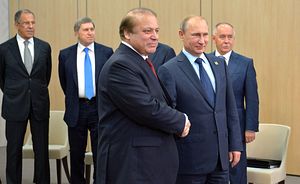Russia is warming up to Pakistan and it’s real this time. There seems to be a reversal in Russia’s South Asia policy, with New Delhi and Moscow drifting apart. Russia is looking the region through the prism of its larger geopolitical struggle with the West and seems ready to join the China-Pakistan axis.
China has found a new ally in Russia, which is keen to join with China, even as a junior partner, to scuttle Western interests. Jettisoning its traditional antipathy to the Taliban, Russia is now indicating that it is ready to negotiate with the militant group against the backdrop of the growing threat of the Islamic State (ISIS) in Afghanistan.
Pakistan has emerged an important player in this context, where China and Russia are now converging to challenge a number of Western objectives. Moscow and Islamabad held their first-ever joint military exercise in September 2016 and their first-ever bilateral consultation on regional issues in December.
After officially lifting an arms embargo against Pakistan in 2014, Pakistan’s military will be receiving four Russian-made Mi-35M attack helicopters this year. It is also likely that the China-Pakistan Economic Corridor might be merged with the Russia-backed Eurasian Economic Union.
In December, Russia hosted representatives of China and Pakistan to discuss developments in Afghanistan and the three agreed upon “a flexible approach to remove certain [Taliban] figures from [United Nations] sanctions lists as part of efforts to foster a peaceful dialogue between Kabul and the Taliban movement.”
The three states underscored their concern “about the rising activity in the country [Afghanistan] of extremist groups, including the Afghan branch of IS [the Islamic State]” and underlined that the Taliban was a necessary bulwark in the global fight against the ISIS. The Taliban obviously welcomed the move.
“It is joyous to see that the regional countries have also understood that the Islamic Emirate of Afghanistan is a political and military force,” a statement issued on the Taliban’s behalf said. “The proposal forwarded in the Moscow tripartite of delisting members of the Islamic Emirate is a positive step forward in bringing peace and security to Afghanistan.”
Though the Afghan government too has reacted strongly against Russian attempts to bolster Taliban’s credibility, there are now indications that Afghanistan will also be invited in the next round of talks. Iran might also be invited. But so far no mention has been made of India, one of most significant actors in Afghanistan in terms of capacity-building.
India’s policy vis-à-vis Afghanistan will also have to evolve with these changing ground realities. New Delhi has been demanding dismantling of safe havens and terror sanctuaries in the region, besides pressing for deeper engagement of various stakeholders for Kabul’s stability and security.
That is easier said than done. Indian interests are being repeatedly targeted in Afghanistan. The attack on the Indian consulate in Jalalabad in March last year was the fourth such assault since 2007. Other Indian consulates in Herat and Mazar-e-Sharif and the one in Kabul have also been attacked. Prime Minister Narendra Modi’s visit to Afghanistan to inaugurate the new Afghan Parliament and the decision to gift Mi-25 attack helicopters to Afghan forces were meant to underline India’s seriousness to preserve its equities in the troubled neighborhood. India signed the TAPI pipeline agreement to showcase its continuing commitment to Afghanistan’s economic viability. India has also signed a deal to develop the strategic port of Chabahar in Iran and agreed on a three-nation pact to build a transport-and-trade corridor through Afghanistan that could potentially reduce the time and cost of doing business with Central Asia and Europe.
But India, which once complained about the readiness of the West to talk to the Taliban, is now faced with another reality: its long-time close partner in Afghanistan, Russia, is now ready to engage with the Taliban. With a pro-Russia Donald Trump assuming office in Washington, New Delhi will be hoping that a rapprochement between the U.S. and Russia might realign Indian and Russian priorities on Afghanistan. How India addresses this challenge will in all likelihood determine the final size of India’s footprint in its neighborhood.

































